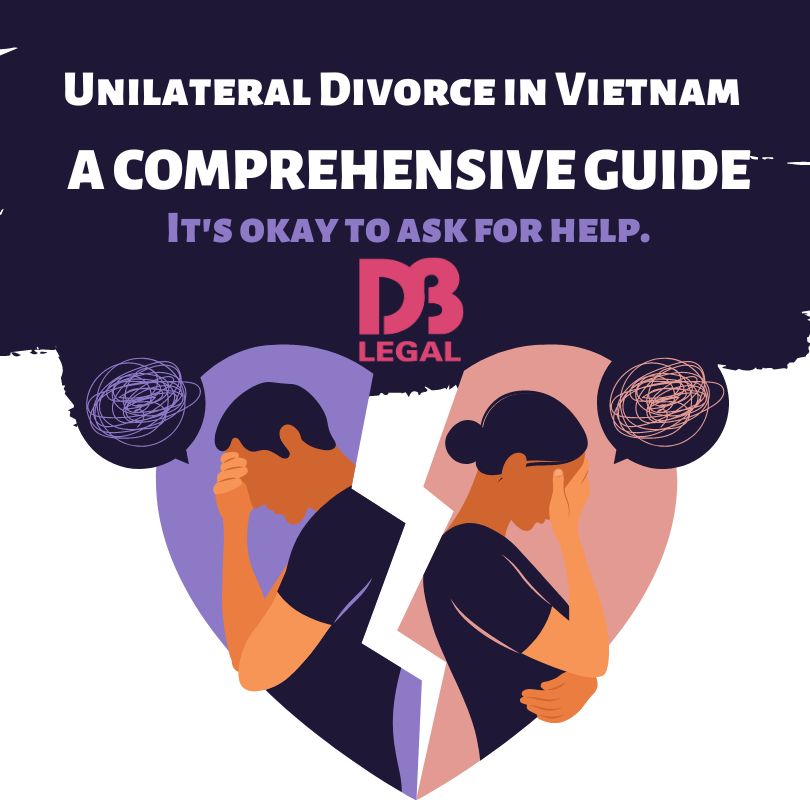Unilateral Divorce in Vietnam: A Comprehensive Guide
Divorce is a challenging and emotional process, and when one party does not consent to the dissolution of the marriage, it becomes even more complex. In Vietnam, unilateral divorce, also known as divorce at the request of one party, involves specific legal procedures and considerations.
Table of contents:
I. This article provides:
- An in-depth look at unilateral divorce in Vietnam.
- Covering legal procedures.
- Property division.
- Child custody.
- Cases involving foreign elements.
II. Understanding Unilateral Divorce
Unilateral divorce occurs when one spouse decides to end the marriage without the other's consent. This type of divorce is governed by the Law on Marriage and Family and the Civil Procedure Code in Vietnam. If the court determines that the marriage has significantly declined and that the couple cannot maintain a shared life or achieve the purpose of their marriage, it will approve a one-sided divorce.
III. Legal Procedures for Unilateral Divorce
1. Filing the Petition: The process begins with filing a divorce petition at the local People's Court where the respondent resides. The petitioner must provide the necessary documents, such as the marriage certificate, identification papers, and evidence backing the reasons for divorce.
2. Court Review: Upon receiving the petition, the court will review the documents and may request additional information. Before proceeding with the divorce, the court will make an obligatory effort to reconcile the parties.
3. Court Hearings: If reconciliation fails, the court will schedule hearings to examine the case. Both parties' arguments will be presented, and the court will consider evidence such as occurrences of domestic violence, unfaithfulness, or other significant breaches of marital responsibilities.
4. Judgment: The court will decide based on the evidence and testimonies. If there are enough reasons for divorce, the court will approve the one-sided divorce and handle matters like dividing property and determining child custody.

IV. Property Division
Property division in unilateral divorce cases can be contentious. The court follows specific principles to ensure a fair distribution of assets:
1. Joint Property: Assets acquired during the marriage are considered joint property and are subject to division. The court considers factors such as each party's contribution to the property, the family's present situation, and any wrongdoings, such as adultery.
2. Separate Property: Property owned by either spouse before the marriage or acquired through inheritance or gifts remains separate. If joint funds have been used to improve separate property significantly, it might be classified partially as joint property.
3. Division Method: The court may not always divide property equally. Instead, it may award each spouse a percentage of the total value. In a scenario, one partner might get 70% of the property worth but is required to reimburse the other partner for the remaining 30%.
V. Child Custody
Child custody is a critical aspect of unilateral divorce, with the court prioritizing the best interests of the child:
1. Custody Decisions: The court considers different elements, such as the child's age, health, and emotional connections with each parent and each parent's ability to offer a stable environment.
2. Primary Custody: Typically, younger children are placed with the mother unless there are compelling reasons to decide otherwise. The preferences of older children can also be taken into account.
3. Visitation Rights: The non-custodial parent is granted visitation rights to maintain a relationship with the child. The court ensures that visitation schedules do not interfere with the child's daily routine and overall welfare.
VI. Unilateral Divorce Involving Foreign Elements
Unilateral divorce cases involving foreign elements, such as one spouse being a foreign national or assets located abroad, add another layer of complexity:
1. Jurisdiction: Provincial-level People's Courts handle divorce cases involving foreign elements. The respondent's residence or the property's location in dispute determines the court's jurisdiction.
2. Applicable Law: The court applies Vietnamese law to divorce cases involving foreign elements. If both partners live overseas, the law of the country they reside in might be applicable.
3. International Cooperation: When dealing with individuals from other countries, the court might request help from foreign officials to collect evidence or make court decisions.
VII. Conclusion
Unilateral divorce in Vietnam is a multifaceted process that requires careful navigation of legal procedures, property division, and child custody arrangements. Understanding the legal framework and preparing adequately can help individuals manage this challenging period more effectively. Whether dealing with domestic or international aspects, seeking legal advice and support is crucial to ensure a fair resolution.
If you have any questions or need further assistance, consulting with a legal expert specializing in family law can provide valuable guidance tailored to your situation.
This information contained herein is of a general nature and is intended to provide updates on the Laws for information purposes only. DB Legal shall not be liable for any use or application of the information for any business purpose.
For more information: Our Vietnamese social page or English social page
Call Us:
| Local Office Numbers: | |
| Hotline/Whatsapp/Zalo: | +84 357 466 579 |
| Email: | contact@dblegal.vn |
Related posts:
- Legal Proceedings at the Specialized Court of the Vietnam International Financial Center
- Summary of Judgment No. 17/2023/KDTM-PT: Application of Incoterms 2010 in International Fisheries Disputes
- WHEN WRONGFULLY TRIED AND CONVICTED: WHAT MUST BE DONE TO SEEK REDRESS ? (Perspectives from First-Instance and Appellate Trials to Cassation – Through Landmark Miscarriage of Justice Cases)
- Analysis of Judgment No. 09/2024/KDTM-PT: A Lesson on the Statute of Limitations in Commercial Disputes
- BUSINESS LICENSE REVOKED: WHO IS RESPONSIBLE FOR DEBT REPAYMENT?
- DISTINGUISHING BETWEEN PROPERTY LOAN CONTRACTS AND PROPERTY BORROWING CONTRACTS
- Law on Specialized Courts at the International Financial Center in Vietnam: A Legal Breakthrough starting 2026
- LIST OF REGIONAL PEOPLE'S COURTS IN HUE CITY (UPDATED 2025)
- Judgment on Website Design Contract Dispute
- Synthesis of Appellate Judgments on Labor Disputes
.png)



